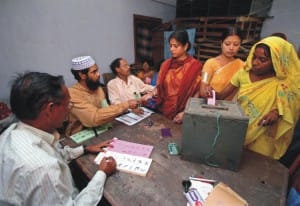Political reforms: Players and prospects

Shafiq Islam/ Driknews
It will be a gross mistake if the parties think they can go back to their old-style politics that led to the break down of the rule of law and made all public institutions non-functional. The parties need to commit themselves to reforms and draw lessons from the mistakes of the post-1/11 government as to the "dos" and "donts" of how to promote reforms.
THE prospects of political reforms, which appeared to be quite bright soon after the change of government on January 11, 2007, now appear to be rather dim. Despite repeated calls for a qualitative change in politics by the military-backed government of Dr. Fakhruddin Ahmed, the results of the city corporation elections held on August 4 this year demonstrated that old-style politics and politicians are alive and well.
The highly visible campaign for "honest and qualified" candidates, launched and sustained by civil society and the media over the last several years, and the frequent public statements supporting the election of such candidates by the chief adviser, members of the Advisory Council and the army chief of staff, General Moeen U. Ahmed, have failed to make any visible impact on the electorate. Instead, voters have decided to elect several candidates who have been imprisoned for their alleged corrupt activities. The re-election of Badruddin Ahmed Kamran from his prison cell, as the mayor of Sylhet with a greater majority of votes than the previous election was a sober reminder to the advocates of "honest and qualified" candidates that such candidates cannot win an election exclusively on their own merit, and would need to draw on the support of the major political parties.
Kamran had been imprisoned since May 29, 2007 on several graft cases, yet he was able to poll 115,446 votes against his nearest rival A.F.M. Kamal's 32,097 votes. Out of the 46 mayoral contestants for the four city corporation elections, 36 lost their deposits. Only those candidates who were supported by political parties, particularly the two major parties, the Awami League (AL) and the Bangladesh Nationalist Party (BNP), did not forfeit their deposits. The results of the August 4 elections thus underscored once again, the importance and the strength of the AL and the BNP as the two main players in our electoral politics.
However, political parties should not misread the election results as a popular verdict against clean politics and an endorsement of going back to politics as usual, marked by mastaans, money, corruption, and confrontation. They need to recognise that the idea of reforms, particularly the anti-corruption drive of the Fakhruddin government, initially had a lot of popular support, but the government made a number of strategic mistakes in pushing the reforms agenda.
The political parties, who now aspire to be at the helm of government after January 2009, need to be responsive to the demand for political reforms. The parties need to design, of their own volition, a comprehensive agenda of reforms which still retain a lot of popular support, particularly of civil society and the media, notwithstanding the election results.
It will be a gross mistake if the parties think they can go back to their old-style politics that led to the break down of the rule of law and made all public institutions non-functional. The parties need to commit themselves to reforms and draw lessons from the mistakes of the post-1/11 government as to the "dos" and "donts" of how to promote reforms.

 For all latest news, follow The Daily Star's Google News channel.
For all latest news, follow The Daily Star's Google News channel. 




Comments